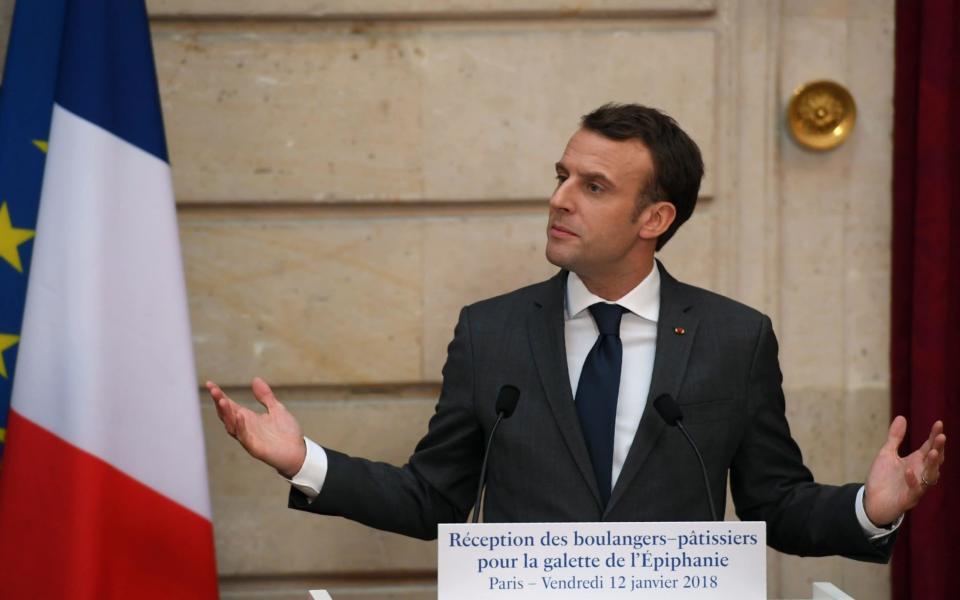France claims to have strong-armed Britain into revising Le Touquet border controls

France claims it has strong-armed Britain into revising the Le Touquet accords governing border controls, creating a joint “operational task force” to handle asylum requests from migrants in Calais.
President Emmanuel Macron is due to meet Theresa May on Thursday for a bilateral summit in Sandhurst but beforehand, he will travel to Calais on Tuesday for his first trip to the channel port since his election last May.
Under the 2003 Le Touquet accord, UK border controls are conducted on French soil but before his election, Mr Macron warned that France could no longer be Britain's "coast guard" and that he wanted to put the agreement "back on the table".
On Monday, Elysée sources said that Britain had agreed that the treaty would not continue in its current form.
“In principle, the British have accepted an additional protocol, a clause or a new treaty,” said the source, adding that the final details were “still being discussed” ahead of the summit.
“It will be a tool that will be legally binding and have the force of a treaty. It won’t be a simple declaration,” he said.
Hundreds of migrants from Iraq, Afghanistan, Eritrea, Ethiopia and elsewhere are sleeping rough in Calais in the hope of reaching the UK despite police dismantling a vast “jungle” camp there late 2016.
While the numbers have shrunk from 8,000 when the “jungle” was open to “between 350 and 500” today, there were still 115,000 “attempted intrusions” by migrants in trucks, trains or boats in Calais last year, the Elysée said.
“The situation has improved but not stabilised,” said the source.
According to Le Monde, the French president will demand that Britain take more migrants in return for French approval for a post-Brexit trade agreement.
The Elysée on Tuesday confirmed that Mr Macron wants Mrs May to “speed up the transfer of (adult) migrants to Britain with legitimate reasons to go there such as family ties” and to “accept more unaccompanied minors and faster”.

At the “heart” of the discussions was a “Franco-British operational task force”, in which home office and French interior ministry agents would jointly handle asylum requests in France.
The French president will also demand more money to “improve border controls but also (for Britain) to take responsibility on the French side for the consequences of managing migrants” after Brexit.
British taxpayers have already paid €140 million towards border security at Calais in the past three years.
Asked how Britain had reacted to the demands, the source said: “There is a very strong insistence from the French side. I’m not saying there is resistance on the British side, rather they are actively listening.”
According to the president’s office, the question of migration was not initially on the agenda at the bilateral summit.
“It is on the president’s insistence that the migrant issue was added to the order of the day,” said the Elysée.
Downing Street had previously briefed that the summit, which in previous years had focused on defence and security, foreign policy, and nuclear energy, would “be broadened to cover the full spectrum of the UK-France bilateral relationship including prosperity, innovation, science and education”.

“The Summit will underline that the UK-France bilateral relationship will continue to go from strength-to-strength following the UK’s departure from the EU,” it said earlier this month.
Mr Macron is expected to use his rising international profile to strike a hard bargain with Mrs May, embroiled in in-fighting over Brexit negotiations.
Domestically, he has seen his popularity rise since successfully passing labour law reforms in France. Some 53 per cent of voters have a favourable view of him, according to a poll for Paris Match last week.
However, immigration and asylum are considered his potential Achilles heel. An immigration bill due to go before parliament this year has caused tensions within his centrist Republic on the Move party, with some seeing it as too harsh.
It includes a move to increase from 45 to 90 days the period during which illegal immigrants can be detained before being expelled from France.
It will also allow police to detain suspected illegal immigrants for 24 hours while checking their papers, compared with 16 hours at present.
The interior minister has meanwhile ignited further controversy by ordering officials to carry out searches in homeless shelters for illegal immigrants.
Mr Macron insists he wants both an efficient and humane immigration policy.

 Yahoo News
Yahoo News 